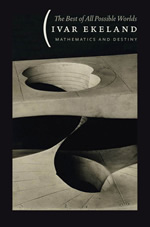Review: Ekeland, The Best of All Possible Worlds
 Joseph Mazur, a professor of mathematics at the University of Marlborough, published a review today of Ivar Ekeland’s newest book The Best of all Possible Worlds: Mathematics and Destiny in the international journal of science, Nature. In his review, Mazur praises the book for its fascinating exploration of the work of eighteenth-century French intellectual Maupertuis, a philosopher and physicist whose ideas—as Mazur notes—continue to have a profound impact in both fields to this day. Mazur writes:
Joseph Mazur, a professor of mathematics at the University of Marlborough, published a review today of Ivar Ekeland’s newest book The Best of all Possible Worlds: Mathematics and Destiny in the international journal of science, Nature. In his review, Mazur praises the book for its fascinating exploration of the work of eighteenth-century French intellectual Maupertuis, a philosopher and physicist whose ideas—as Mazur notes—continue to have a profound impact in both fields to this day. Mazur writes:
The eighteenth-century French philosopher Pierre-Louis Moreau de Maupertuis gave us the principle of least action: in all natural phenomena, a quantity called ‘action’—for him, the product of mass, distance travelled and velocity—tends to be minimized. In his view, God, being the supreme mathematician, had created the “best of all possible worlds” by insisting that everything in it obey the principle of least action, an economy of effort—a metaphysical rule designed to support the laws of mechanics.
In The Best of All Possible Worlds, Ivar Ekeland skillfully traces the historical developments of de Maupertuis’ principle as it matured from a metaphysical directive in physical two- or three-dimensional space to a mathematical principle in a conceptual space where the action is not just minimized but stopped altogether. He then tracks it further to our modern notions of randomness measured by probabilities.
Yet despite its heavy subject matter, Mazur’s review continues:
This complex story can be read with a minimum of effort, and we are left feeling that Maupertuis’ principle works, even though we know that randomness is hardly compatible with minimizing actions.… [Ekeland’s] explanations are clear and elegant, in the brilliant, effortless manner of Richard Feynman, and his prose is fluid, exhilarating and suspenseful. I tried to put this superb book down after chapter 4 but couldn’t. It was as if some compelling force of nature had a purpose, an opposing directive in the best of all possible worlds.